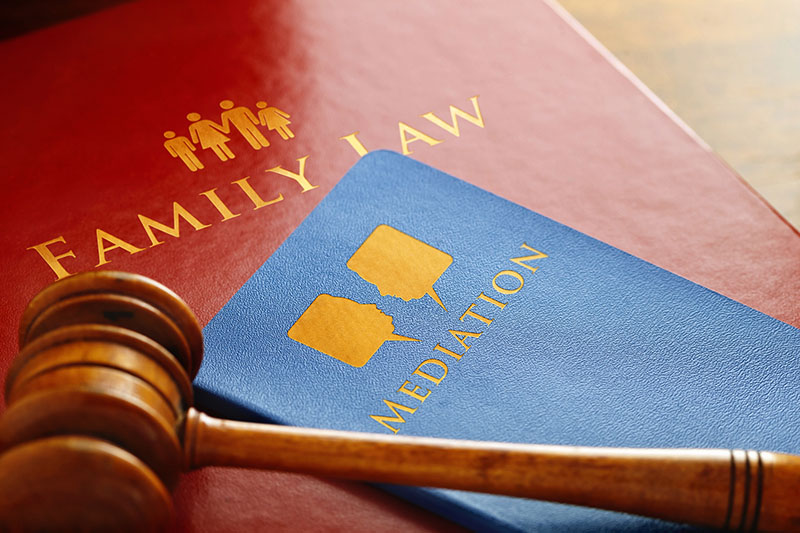Family Law Mediators

Our family mediators have successfully helped people just like you find common ground and negotiate solutions to many family law issues including divorce, child custody, child support, and child visitation. We have found clients who are able to utilize a neutral mediator to solve family law issues not only avoid the anxiety of going to court but also costly attorney and court fees.
Continue to read below to learn more about the mediation process and the benefits of using a mediator to arrive at a family dispute resolution. If you would like to know if you are a good candidate for family law mediation, contact our office today for a free initial consultation with our experienced mediators.
What is Family Law Mediation?
The mediator cannot give advice to either party, nor act as a lawyer for either party. The mediator highlights issues for both parties to be aware of, the strengths and weaknesses in their positions, and proposes possible outcomes and solutions. In many cases, this process can be a more constructive, low-key option which focuses on the goal of helping the parties jointly resolve the case in a safe and private environment.
Because the mediation process is voluntary, it continues only so long as the parties and the mediator agree it is productive and should proceed. Any party can withdraw from the mediation process at any time, for a good reason, a bad reason, or no reason at all.
What Are the Advantages and Benefits of Mediation?
Mediation is a type of alternative dispute resolution intended to be a more low-key and less adversarial option where a neutral mediator attempts to bring the parties to an agreement. Our experienced family and divorce mediators at the Lewellen Family Law Firm help parties negotiate a settlement in a supportive, empathetic, and neutral environment.
Mediating couples can realize many advantages and benefits over the traditional family court system including:
- More likely to be satisfied with the process and the results
- Likely to spend less money to resolve the case
- Generally, come to a resolution in a fraction of the time normally required
- Retain control of outcome rather than leaving it to a judge’s discretion
- Are less likely to return to court later to fight the outcome
- Keep the process private and out of court records
- Ability to work with scheduling needs rather than the courts schedule
Proven Mediation Process
By applying our extensive legal knowledge and experience, our mediators enjoy helping people resolve their differences and move on to the next chapter of their lives. Our proven mediation process utilizes a full toolbox of techniques to resolve even the highest conflict issues.
While each client’s case can have unique issues and we craft our approach to each specific situation, we start each case with our proven process which includes:

Step One: Free Initial Consultation
Parties contact our office for an initial free consultation. This consultation allows all parties to meet the mediator, ask questions, and understand the process and benefits of mediation.

Step Two: Preparation and Planning
When both parties agree to participate in mediation, we begin the initial preparations required. This can include reviewing the required legal documents such as the Petition, Response, Preliminary Declaration of Disclosure, and Judgment papers in the case of a divorce.

Step Three: Pre-mediation Private Sessions
Before the negotiating begins, the mediator will meet with each party privately to understand the unique issues and concerns they have. The mediator uses this information to create a tentative schedule and agenda.

Step Four: Joint Meetings & Negotiations
All the parties are brought together to review each parties’ interests and positions in the case. The mediator will address each issue individually, allow the parties to express their stance, and work to bring them to a mutually satisfactory agreement or compromise.

Step Five: Summary Memoranda or Term Sheet Creation and Review
The mediator works with the parties to jointly create a non-binding summary memoranda or term sheet which summarizes the agreement. Each party will have the opportunity to review the tentative agreement individually and by legal counsel if desired.

Step Six: Final Settlement Agreement & Submission
When all parties agree to all the terms of the tentative agreement, we can prepare all required court papers, deeds, and other documents, or the parties can have other legal council prepare it. The documents are then submitted to the California family court for final judgement.
Additional Family Law Services We Provide
- Divorce
- Child custody
- Domestic violence restraining orders
- Division of property
- International or out-of-state removal of minor children
- Spousal support
Frequently Asked Questions About Family & Divorce Mediation
Can you get a divorce with just a mediator?
How long does it take to get a divorce with mediation?
How do I prepare for divorce mediation?
How much does divorce mediation cost?
One of the largest benefits of mediation over the traditional divorce process can be a significant cost savings. Using a mediator can allow parties to work together in negotiating a mutually satisfactory agreement or compromise without the need of costly legal teams.